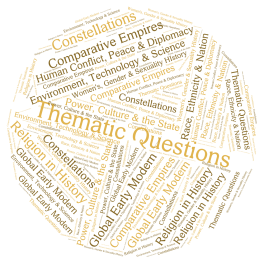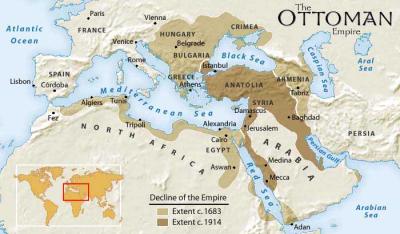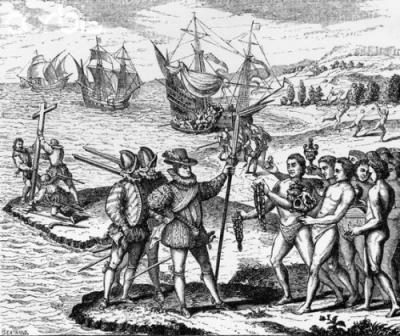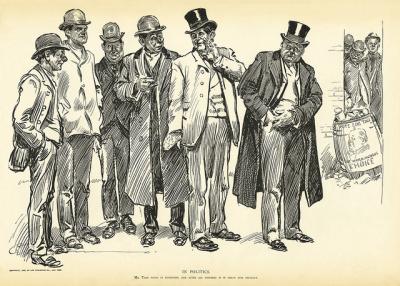Constellations

The History Constellations offer programs of inquiry for students and faculty that builds upon on our wide range of talents. Maintaining our commitment to the traditional regional and chronological fields of study, we have organized ourselves into cross-cutting Constellations that are framed around the thematic questions that we all ask as we study the past, questions such as the workings of the state, the construction of identity, and the environmental circumstances of human life. The thematic framing of these constellations strengthens our connections with scholars and students working throughout the university.
These thematic Constellations are options for both undergraduates and graduate students. Undergraduates may use the Constellations to fulfill a "thematic concentration" in either a history major or a history minor. Graduate students, in consultation with their advisers, may use a Constellation to organize a Minor Field of Study. Graduate Major fields are associated with three Constellations: Environment, Health, Technology, and Science; Human Conflict, Peace, and Diplomacy; and Women, Gender, and Sexuality. The Constellations are the framework for seminars and conferences involving students, faculty, and scholars from around the university, the country, and the world. There have been two of these Constellation-affiliated programs at the Center for Historical Research: the 2011-2013 Program in “Health, Disease, and Environment in World History,” and the 2013-2015 Program in "State Formations: Histories and Cultures of Statehood." The new Constellation program is reshaping our teaching, and our conversations within and beyond the department.
Constellations
- Comparative Empires — Bridge the historiographical gap between territorially contiguous Old World empires and colonial empires
- Environment, Health, Technology, and Science — Explore the historical interrelationships of the human and nonhuman worlds
- Global Early Modern — Forum of collaboration and engagement in early modern history
- Human Conflict, Peace, and Diplomacy — Focus on human conflict as an engine of historical change
- Power, Culture, and the State — Think broadly about the how power has been exercised in the historical past
- Race, Ethnicity, and Nation — Examine the relationship between the concepts of race, ethnicity, and nation
- Religion in History — Share teaching and research interests in the study of world religions
- Social Justice History — Study the roots of today’s social justice issues and learn about the many ways that justice has been understood over time.
- Women's, Gender, and Sexuality History — Scholarship on women, gender, and sexuality that is comparative and global in scope
Comparative Empires
The comparative study, both synchronic and diachronic, of empires has recently entered a period of intense and fruitful activity, with a raft of conferences, publications, and faculty hires dedicated to the enterprise. The comparative empires constellation helps to bridge the historiographical gap between territorially contiguous Old World empires, such as the Ottoman, Mughal, Habsburg, Russian, Ming, and Qing, and colonial empires with significant overseas possessions, notably those of Spain, Portugal, Britain, and France. All these empires faced many of the same opportunities, challenges, and constraints in their expansion, administration, maintenance, contraction, and dissolution. By the same token, landed empires bear comparison to empires with overseas colonies where administrative strategies and center-periphery relations are concerned.

Recent research on specific empires has emphasized not only strategies and mentalities of imperialism and colonialism, but also imperial state formation, center-periphery relations (whether these pertain to the metropole vs. the colonies or the capital vs. the provinces), inter-provincial or inter-colonial relations, decentralization, recentralization, and the construction of imperial ideologies, including a species of non-nation-state-centered nationalism.
Ohio State’s History Department is in an ideal position to host such a constellation. We have particular strengths in the history of the Ottoman, Mughal, Spanish Habsburg, Russian, French, and British empires, as well as expertise in the relatively transient empires of early modern Central Asia and the trading-network mini-empires of Southeast Asia. Furthermore, this constellation actively integrates a number of regional campus faculty members, thus contributing to the goals of the department’s Master Plan and to the broader goal of “One University.”
This constellation is inspiring minor fields and will surely inspire major fields for general examinations among the department’s graduate students. Undergraduate History majors with interests in the regional fields represented by the empires mentioned above will likewise find this constellation a productive means of organizing their coursework. By the same token, the constellation will create opportunities for comparative courses jointly taught by constellation members at both the undergraduate and graduate levels.
Course Listing
Faculty Members
Affiliated Graduate Students
(top of page)
Environment, Health, Technology, and Science

The place of humanity in the material world has become one of the central questions of our time. The members of the OSU History Constellation in Environment, Health, Technology, and Science explore the historical interrelationships of the human and nonhuman worlds. Our teaching and research expands the field of environmental history, broadly defined, to the arenas where it intersects with the history of technology, economic history, climate, demography, biology, public health, the history of science and medicine, and a variety of related fields. While our research and teaching range widely in chronology, geography, and approach, the constellation faculty share commitments to local, regional, and global approaches to the material and cultural relationships between nature and humanity, and to assessing their implications for public policy.
Members of the constellation regularly teach a range of courses at the undergraduate and graduate level. We offer a Major Graduate Field for History Ph.D. students, and we encourage undergraduates to develop a major concentration within the constellation: please feel free to consult with any of the members about a graduate major field or undergraduate concentration.
The constellation hosted the 2011-2013 Center for Historical Research series on “Health, Disease, and Environment in World History,” and continues to host invited seminars and lectures by scholars from the department, the university, and across the academy.
Course Listing
Faculty Members
Affiliated Graduate Students
(top of page)
Global Early Modern

The early modern era represents a period of unprecedented global integration. From the end of the fifteenth century, peoples of distant regions were brought into closer contact with each other. The results of these interactions altered historical trajectories, revolutionized economies and global politics, and set the stage for the making of the world we know today. This constellation represents a forum of collaboration and engagement for faculty and students whose work in early modern history engages one or more of the following: the defining features of early modernity; the intensification of globalizing processes in the early modern era; mobility and migration; technology and the early modern state; developments in global power relations, colonialism, and the historical sources of inequalities in the modern world, including inequalities based on gender, race, class, and ethnicity; and the transregional movements of wealth and merchandise, technologies, ideas, culture, disease pathogens, and more. We bring together faculty and students engaged in studying how these historical processes developed over time to create the modern era, in its many manifestations.
Courses Listing
Faculty Members
Affiliated Graduate Students
(top of page)
Human Conflict, Peace, and Diplomacy

The Human Conflict, Peace, and Diplomacy constellation focuses on human conflict as an engine of historical change. Constellation members seek to understand the root causes of violence, from its biological and psychological foundations to the nature of the state system and other imperatives that drive human aggression and the will to dominance. They examine the shifting balance between conflict and stability, both internationally and domestically, with topics ranging from mob violence, banditry, and terrorism; through slavery and genocide; to wars within and between states. They also seek to understand efforts to control, limit, mitigate, or prevent collective violence through alternative forms of conflict resolution ranging from nonviolent resistance and pacifism to diplomacy, arms control, and other international arrangements.
Teaching and research by members of this constellation combine thematic fields (such as diplomatic and military history, the history of technology, political history, and economic history) with geographic and chronological history and a variety of related fields in political science and international relations. Interests of the constellation faculty span the globe and range widely across the broad continuum of human history.
Course Listing
Faculty Members
Affiliated Graduate Students
(top of page)
Power, Culture, and Society

This constellation offers undergraduates, graduate students, and faculty the opportunity to think broadly about the how power has been exercised in the historical past, both in the formal realm of the state and the informal realm of culture. We offer courses across the history curriculum and sponsor seminars and occasional lectures that help us think through these issues in a wide range of contexts in time and space.
The History Constellation in “Power, Culture, and Society” brings together historians trained in social, cultural, intellectual, gender, and political history who share broad common interests in the circuitry of political authority and cultural power in societies ranging from the ancient to the modern. We are particularly interested in a comparative and trans-national history that explores the various manifestations of “the political” in time and space. Questions that interest us include state-formation and revolution, the gendered or racialized state, law and society, self-governance and the welfare state, regime-legitimation, citizenship and group identity, the discursive construction of authority and transformation, the formation of opinion and the public sphere.
The scholarship of many members of the constellation engages with contemporary social and political theory; many seek to reach a broader public by combining scholarship with either older or new narrative forms, including anthropologically-informed micro-history. As engaged academics, we prize the creative tension that these diverse approaches bring to our work. As engaged teachers, we work to develop in our students an appreciation of the many ways in which historians illuminate the various workings of power in past time.
In 2013-2015 members of the PCS constellation are running a Center for Historical Research series entitled "State Formations: Histories and Cultures of Statehood."
Course Listing
Faculty Members
Affiliated Graduate Students
(top of page)
Race, Ethnicity, and Nation

The Race, Ethnicity, and Nation constellation examines the relationship between the concepts of race, ethnicity, and nation in a variety of geographical and chronological contexts. We are committed to promoting comparative analysis of three main sets of issues.
First, we focus on the process by which ethnic and racial groups were formed within particular national and colonial contexts as well as the political, economic, and cultural implications of these differentiations. To explore these questions, we ask how differences in culture, religion, language, and skin color became codified and formed the basis for unequal distributions of economic resources and political power. We also examine the various ways in which the marginalized groups resisted such inequalities. Second, our proposed constellation examines the significance of diasporic and transnational ties, particularly for marginalized ethnicities and racialized groups. Here, we go beyond the nation-state to explore the economic, cultural, and political connections that shape migration patterns, community formation, identity construction, and citizenship. We seek to analyze how marginalized groups constructed alternative nations, sovereign and/or “imagined.” Finally, our constellation is invested in exploring the intersection of gender and sexuality with race, ethnicity, and nation. We are interested in understanding how ethnic, racial, and national differences were frequently defined through projected differences in gender and sexual norms and practices; how “protecting” racial and ethnic boundaries often entailed policing gender and sexual behavior; and how assumptions regarding gender and sexual difference and hierarchies were utilized both by dominant groups to justify inequality along racial and ethnic lines and by marginalized groups to advocate for social inclusion.
Our constellation unites faculty members, including regional campus colleagues, across numerous fields and specializations, such as African, African American, American Indian, Asian American, Atlantic World, Early and Modern European, Early and Modern U.S., Jewish, Latin American, Latino/a, South Asian, and Women’s History.
The concepts of race, ethnicity, and nation are often foundational to our fields. However, the scholarship in our areas of specialization are not always in conversation with one another. The constellation provides an opportunity to engage different and at times divergent historiographies to develop a comparative understanding of race, ethnicity, and nation. The range of geographical and chronological fields included in this constellation is one of the unique features of the OSU History Department. In fact, our constellation features faculty whose expertise spans across five continents and who utilize diverse methodologies to engage the issues.
We believe a constellation on race, ethnicity, and nation will attract students of all backgrounds and that it could be of particular interest to students from underrepresented backgrounds. In addition, we hope that our History courses that feature race, ethnicity, and nation will attract students and faculty from other disciplines, thereby promoting intradepartmental dialogue and also foster interdisciplinary intellectual synergy.
Course Listing
Faculty Members
Affiliated Graduate Students
(top of page)
Religion in History

Contemporary world events and growing tensions between secularizing tendencies and religious ideologies continue to underline the need to understand the dynamic relationships among religion and society. Moreover, the disparate strategies used to analyze religious experience and ideologies have produced new approaches to the study of history, society, and thought in general.
Members of this Constellation share teaching and research interests in the study of world religions in their historical contexts. They approach religion as a system of ideas and practices that is embedded in past political, social, and cultural orders. They are especially interested in how religion relates to power, violence, sexuality, gender, identity, science, education, literature, and art and to the changes it undergoes through geographic, cultural, and chronological transmission. Some of them study how individuals have made sense of (if not rejected) religion in their everyday life; others explore the institutional mechanisms through which religious ideas and practices emerge and become the framework of daily life. Some consider how religions adapt to changing political, social, and cultural circumstances.
The teaching and research interests of the affiliated faculty members vary in methodology, geography, and chronology, thus reflecting the diversity and complexity of the study of religion itself. They embrace all of the major geographical areas of the globe and our chronological focuses range from antiquity to the present.
Course Listing
Faculty Members
Affiliated Graduate Students
(top of page)
Social Justice History

The year 2020 witnessed one of the largest mass movement protest events in the history of the United States. Following a series of high-profile police killings of Black people around the nation, the murder of George Floyd by a Minneapolis Police Office in May of that year pushed the nation past the tipping point. Decades of anger, frustration, and community organizing erupted into a nationwide, decentered, protest movement under the banner of “Black Lives Matter.” Social justice proponents across the world joined this protest to raise their own local questions about racism and equity. This thematic constellation provides a framework for students to examine the history of the struggle for social justice on a global scale.
The Social Justice history constellation includes a curriculum that is both broad and deep. Students have the opportunity to explore social justice history on a global scale, and in the modern, medieval, and ancient periods. This provides students the opportunity to expand their understanding of pressing contemporary issues by engaging the origins of those issues and the ways that societies have dealt with them in the past. It also offers students the opportunity to think critically about the ways that notions of difference, justice, and equity have been constructed in different times and places.
The Social Justice Constellation provides students with a clear pathway to developing an understanding of social justice history and earning credentials in that important area. Broad in scope, it enables students to connect coursework on the histories of race, gender, and ethnicity to the economic, labor, and ecological injustices that have shaped our modern world.
Course Listing
Faculty Members
Graduate Students
Women's, Gender, and Sexuality History

The women's, gender, and sexuality history (WGSH) program at Ohio State University is committed to teaching and scholarship on women, gender, and sexuality that is comparative and global in scope. Our faculty specialize in a variety of chronological periods, ranging from ancient times to the modern era. We also cover diverse geographical areas, ranging from Africa, Asia, Europe, Latin America, to the U.S. We teach classes and conduct research on a variety of topics, such as social movements; politics, the state and citizenship; childhood and family; sexuality; health; race, indigeneity, and immigration; as well as popular culture.
Course Listing
Faculty Members
Affiliated Graduate Students
(top of page)
